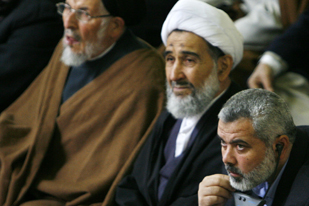It's unlikely that the latest remarks by Palestinian Prime Minister Ismail Haniyeh are going to change the minds of those in Europe and elsewhere who insist that Israel negotiate with Hamas. A favored argument among these people is that the Hamas government was democratically elected, and that Israel and the U.S. are therefore obliged to talk to it. Critics of Israel's current policies vis-à-vis the Hamas government also argue that Israel's demands that Haniyeh's government honor past agreements and recognize the state's existence are somehow unreasonable. It is one thing to argue for negotiations on the basis of realpolitik. But much of the criticism of Israel and the U.S. on this particular issue is actually advanced on normative grounds of one sort or another. I have a feeling that Western Europeans and their friends in the American academy will continue to express their exasperation about Israel's policy while downplaying statements such as these, made today in Iran by the Palestinian PM:
"We will not give up our Jihadist movement until the full liberation of Beit al-Muqqadas [Jerusalem] and Palestinian land."It is astounding that anyone would continue to insist that Israel has a duty to negotiate with the Hamas government.
"The Zionists ... want us to recognize the usurpation of our land ... but these things will never happen.
"We will never recognize the usurping Zionist regime." (Source: Al Jazeera).

3 comments:
There was a debate, I believe hosted by the Council on Foreign Relations, on NPR the other day, which featured Ambassador Ayalon (not exactly Israel's most eloquent advocate) and some equally brutish anti-Zionist luminaries, debating the proposition, "Does Hamas' success in the PA elections render it no longer a terrorist organization." Though the debate was conducted at a very childish level, I think the question is important. What exactly is the nature of the legitimacy that success in the democratic process confers upon Hamas? One has to take this question more seriously, I think, than the question, "What legitimacy is confered by the fact that Hamas provides social services to Palestinians?" If the goal is (and I think this was the American idea in pushing for free and fair elections in the territories, in the first place) to urge Hamas toward a Sinn Fein/IRA mutation and normalization via the political process, Hamas may have to be "appeased" in some way. It's all about incentives.
Noah - to me this is not really about the question of Hamas's legitimacy. It's about the organization's ideology and its actions. They can have all the legitimacy they want - Israel is not obliged to talk to an organization that rejects its very existence. Have you read the latest to come out of Iran? Here's a sample from Ha'aretz:
Speaking to thousands of students at the University of Tehran on Friday, Haniyeh said: "The braggart of the world [the United States] and the Zionists ... want us to accept the theft of Palestinian lands, stop the jihad and the resistance and accept the agreements signed with the Zionist enemy. We will never recognize the Zionist government. We will continue the jihad until Jerusalem is liberated."
I don't see what difference Haniyeh's "legitimacy" makes to the political calculus. There is simply no basis for negotiations here.
You guys might be talking about two different things. Noah, I, too, listened to that debate on NPR's Intelligence Squared, and you're so right, the level of discourse was incredibly low. The question is interesting because it examines the definition of the label "terrorist organization." The U.S. refuses to recognize any such party as a legitimate partner in negotiation, and the debate was (at least initially) about whether the U.S.--not Israel--should recognize EVERY democratically elected government.
American recognition of Hamas is at least CONCEIVABLE, by which I mean, the CFR can have a debate about it. After all, Hamas has never denied the U.S.'s right to exist, and that's the bottom line here, right? If it were in the U.S.'s interest to support Hamas, we all know that the latter would very quickly be redefined as a "liberation struggle" party or something like that. On the other hand, to me, Israeli negotiation with Hamas in its current form is inconceivable not because Hamas is a "terrorist organization," i.e. dedicated in their charter to violence as the best means to their end--so is the PLO and Israel eventually negotiated with THEM--but because there is no promise of mutual recognition. That was a stipulation for negotiations with the PLO and it has to be for Hamas as well. Asking them to renounce violence is a thornier issue, but mutual recognition seems like a no-brainer.
Post a Comment